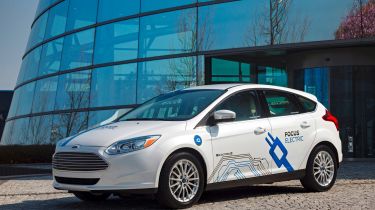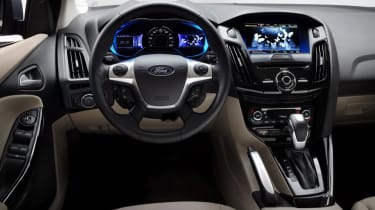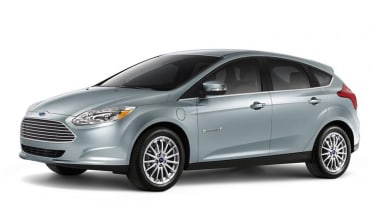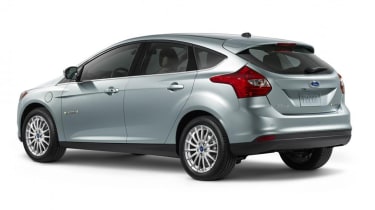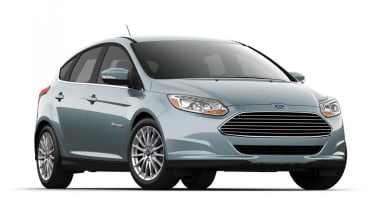Ford Focus Electric (2013-2018) review
The Ford Focus Electric is cheap to run, but not much fun. It’s not as practical as a regular Focus either

Just so you know, this is an older review of the 2013-2018 Focus Electric. If you are interested in information about the current Ford Focus, or news about the latest Ford models, please follow the links provided.
The all-electric Ford Focus has been on sale in the UK since 2013, but you might easily have missed it. Apart from large Electric badges on the front doors and rear hatchback, the only other obvious giveaway is the circular flap on the front wing that lifts to reveal the car’s charging plug – and the absence of a fuel filler flap on the rear flank.
The Focus Electric is essentially a regular hatchback converted to an electric powertrain, which puts it at something of a disadvantage to some rivals such as the Renault Zoe, Nissan Leaf and BMW i3, all of which were developed from scratch around their electric drivetrains. It has more in common with other electric ‘conversions’, including the VW e-Golf and the Kia Soul EV, both of which use a regular production model as their starting point.
The Focus Electric has its motor and single speed transmission located under the bonnet, and 300kgs of lithium ion battery under the rear seats, gobbling up boot space. The batteries are liquid cooled in an effort to maximise efficiency and battery life. There’s an on-board regenerative braking system that captures up to 90 per cent of the energy lost to friction when braking, recycling it back into the battery to further optimise range. The battery-powered Focus gets a unique set of digital instruments, and one of its features is a ‘brake coach’ display that shows how much energy you’re capturing, and can help maximise range with most efficient use of the stop pedal.
Used - available now

2023 Audi
Q4 Sportback e-tron
28,511 milesAutomaticElectric
Cash £22,500
2023 Tesla
Model 3 Premium
40,151 milesAutomaticElectric
Cash £20,600
2024 Vauxhall
Grandland
16,312 milesAutomaticDiesel1.5L
Cash £17,800
2023 Mercedes
CLA Shooting Brake
14,167 milesAutomaticPetrol1.3L
Cash £22,299Otherwise, the Focus Electric will feel pretty familiar to regular Focus models from the perspective of the driver’s seat.
To help justify its impressively high price-tag, the model comes with a kit list that’s pretty loaded, and on a par with the Focus Titanium.
That means you get a high performance Sony DAB sound system, and Ford SYNC 3 with an 8-inch touchscreen, 17-inch alloy wheels, keyless-go, dual zone climate control, cruise control, leather trimmed steering wheel and sports-style seats.
A Ford Focus in traditional petrol or diesel guise is one of the best-handling and most fun to drive family hatchbacks around. Sadly, the conversion to battery power does nothing for driver engagement, and the Focus Electric feels stodgy and stiffly sprung in comparison. There’s less boot space too, as the batteries take up quite a lot of room.
The model is quiet and refined though, and once you’ve got past the high purchase price it’s going to cost peanuts to run. Watch out for swingeing depreciation or, better still, let your company buy the car and take the hit, while you enjoy the considerable tax benefits of a zero-emissions rated motoring.
Engines, performance and drive
The standard petrol or diesel Ford Focus is an engaging car to drive, with a neatly balanced chassis, responsive steering and a sense of lively agility that’s backed up by suspension that offers a composed and supple ride. In fact, it’s a class-leader, and owners switching to the electric model may feel justifiably disappointed that a lot of that finesse has been lost in translation.
The primary problem is the considerable weight of the battery packs at the rear of the car, which has necessitated the addition of significantly stiffer springing. It means the Focus is noticeably firmer over bumps, and an enthusiastic driver will always be conscious of that extra weight at the rear.
The fun is further dampened by brakes that feel grabby and awkward especially around town, which is an unwelcome side-effect of the energy regeneration system.
On the positive side, for drivers who are unimpressed by the regular Focus models’ dynamic advantages, the electric car’s cabin is whisper-quiet and remains calm and relaxed all the way up to motorway speeds.
Engines
The Focus Electric’s powertrain has recently been upgraded to maintain competitiveness – or at least the batteries have. The car now comes with batteries rated at 33.5kWh, which is a worthwhile upgrade over the previous 23kWh set-up and increases maximum range. The upgrade doesn’t affect acceleration as the 107kW electric motor is unchanged. It’s the equivalent of 143bhp in petrol or diesel terms, and coupled with 250Nm of torque it gives the electric Focus a decent turn of speed off the line. 0-62mph comes up in 11.3 seconds, but it feels faster due to the instant torque characteristics of the electric motor, and there’s enough torque to make the steering wheel squirm in your hands while the tyres struggle for traction. Any excitement tails-off a bit after that, and maximum speed is 86mph.
MPG, CO2 and Running Costs
On a full charge, and in optimal driving conditions, Ford reckons it’s possible to eke 139 miles out of a fully charged battery following the recent upgrades. Of course, conditions are rarely optimal, and in winter with headlamps, wipers and heater working hard you could potentially see that number halved. Nonetheless, with the cost of an overnight charge coming out at little more than £2, we’d not expect to hear too many complaints about running costs. CO2 emissions from the vehicle itself are zero, and as an ‘early adopter’ the additional load you’re placing on the national grid will be marginal.
There are plenty of other advantages of course, including free road tax and exemption from the London congestion charge, and zero emissions mean big savings for company car drivers too. The £31,625 Focus Electric will cost a 20 per cent taxpayer £569 annually as opposed to £1,332 for the £26,630 2.0 TDCi Focus Titanium Powershift Auto. For 40 per cent taxpayers the figures are £1,139 and £2,663 respectively.
Unfortunately, awful predicted depreciation spoils the fun for whoever has to buy the vehicle, so while employees save a packet their employer will end up paying thousands more for the privilege of a ‘green’ corporate conscience.
Insurance groups
The Ford Focus Electric is rated as insurance group 20, which is equivalent to the 1.5-litre petrol Ecotec-powered Focus. It’s also the same insurance group as the VW e-Golf.
Depreciation
Depreciation is a nasty business at the best of times, but with the Ford Focus Electric you’ll be seeing it at its worst. While drivers of regular Focus models might expect their cars to retain around a third of their new value after three years and 30,000 miles of motoring, electric hatchbacks and compact cars from many manufacturers routinely seem to suffer falls that are closer to 20 per cent. When you factor in the high purchase price of the Focus Electric, the losses can look very painful.
Interior, design and technology
While the exterior design of the Focus Electric is very similar to other models, those in the know will spot the unique design of the body-coloured front bumper, and also the body-coloured rear spoiler. The spec also includes 17-inch 15-spoke alloy wheels, but they’re a pretty standard design compared to some of the more overtly ‘aerodynamic’ styles offered by competitors. The radiator grille opening is standard Focus too, and the only bit of EV tech on display is the charging port flap. When it’s open and plugged in, there are four blue LEDs that light up sequentially to indicate the level of charge. The lights are designed to be visible from a distance, so you can keep an eye on progress.
You can order your Focus Electric in one of five colours, which are rather restrained shades of white, silver or grey, apart from a brighter (electric) blue. The interior features heavily grooved seat fabrics, and everything is in charcoal black.
The interior design of the car is pretty much standard Focus too, although the bespoke instrument cluster is designed to deliver the sort of info on energy usage, battery charge and range that are so vital to planning journeys when driving an all-electric vehicle. The main instrument binnacle comprises a central speedometer with drive selector mode display, while either side there are graphics providing info to help you improve your efficiency. When you’re driving to the computer’s satisfaction, there are even animated butterflies that flutter around the display.
Sat-nav, stereo and infotainment
The Focus Electric comes with Ford’s latest SYNC 3 infotainment system and an 8-inch touchscreen mounted centrally on the dash. It’s loaded with features including voice control that recognises simple phrases like ‘I’m hungry’ and searches for local restaurants on the sat-nav. There’s also a function that reads out your text messages on the move, and the system connects via Applink, Apple CarPlay and Android Auto.
You can also download the MyFord Mobile app which allows you to view your car’s battery charge and schedule charging to use cheap rate electricity, pre-warm the cabin on cold mornings, check out your driving efficiency and find charging stations for journeys you’re planning.
Practicality, comfort and boot space
As we’ve mentioned already, the Focus wasn’t designed around its battery pack, rather they’ve been shoe-horned in later. This means you lose quite a lot of the space allocated for luggage if you choose the EV option.
That said, as the interior design and packaging of all Focus models is pretty good, and because seat comfort is the same for all models, it’s unlikely to be the loss of a bit of boot space that defines whether you can live with the Focus Electric.
Far more significant issues for most drivers will be the battery range, and the options for charging. If you have to leave your car parked on the road overnight, plugging in could be a serious hassle. Relying on the UK’s limited network of public charge points is not currently a viable option as your main source of power, but of course they do come into their own if you need to exceed the car’s 140-mile range. A public fast-charger should give you 80 per cent of charge in 30 minutes, but that doesn’t allow for waiting times if someone is ahead of you. Quite a lot of charge points seem to be maintained sporadically too, which means out of service units can throw a spanner in your carefully plotted navigation plans.
Size
The Focus Electric is the same size as all its sister models – which means 4,391mm long, 1,823mm wide and 1,477mm tall. That’s pretty much standard fare for the family hatchback class.
Leg room, head room & passenger space
The Focus isn’t the best packaged family hatchback, and plenty of rivals offer more knee and foot space for rear seat passengers. That said, the space is adequate for transporting five adults in comfort, and there’s room to fit rear-facing child seats – Isofix mountings are provided for the purpose of course.
Boot
As already mentioned, the battery pack reduces the already less-than-competitive Focus’s boot from 316 litres to 237 litres. That said, the tailgate opens nice and wide so access is easy.
Reliability and Safety
The standard Focus ranked 51st out of 71 cars featured in our 2017 Driver Power survey, which isn’t an electrifying score by any means. Reliability was ranked below average, with nearly eight per cent of owners reporting at least one fault within their first year of ownership.
It’s difficult to extrapolate those results directly to the Focus Electric, as the powertrain and its controlling electronics use entirely different technology to the rest of the range. That said, the Focus Electric and its internal combustion-powered sister models do share items like axles, brakes and suspension, as well as much of the electronic systems for lights and accessories. The trim and fit and finish is identical too.
The regular Focus model has been crash tested by Euro NCAP and performed well, scoring five stars. There hasn’t been a separate test for the Focus Electric, but we’d hope for a similar level of competency. You can’t however upgrade your Focus Electric with latest safety assistance systems like autonomous braking or lane-keeping – both of which are available elsewhere in the Focus range.
Warranty
All Ford vehicles come with the manufacturer’s standard three-year/60,000 mile warranty.
Servicing
Maintenance costs for the Focus Electric should be similar to other Focus models, but check with your dealer for details.
